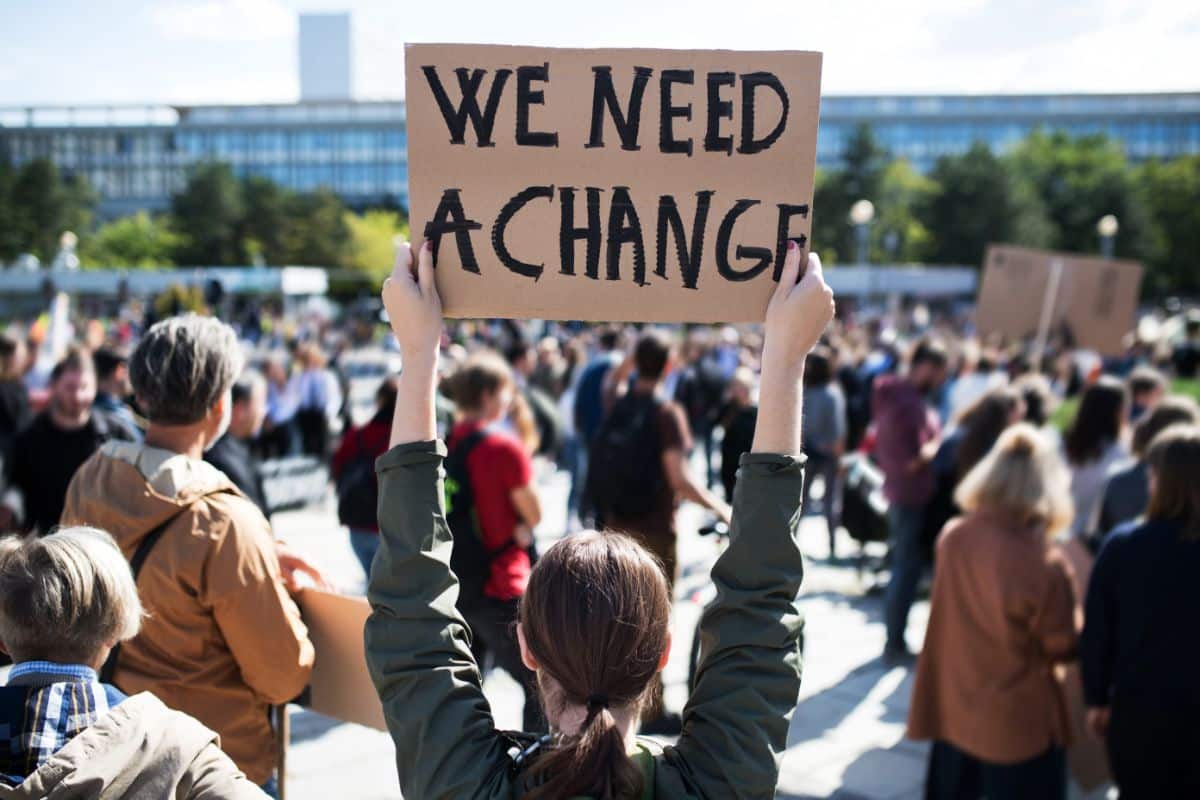In our ever-evolving society, numerous topics unnecessarily ignite controversy. This exploration - 38 things that are controversial that shouldn’t be - aims to shed light on such issues. These subjects often reveal more about societal norms and biases than the topics themselves.

From personal beliefs to social practices, we delve into why these matters become contentious. This list challenges us to reevaluate our perspectives and understand the underlying reasons behind these unwarranted controversies. Let's embark on this enlightening journey.
Jump to:
- 1. The Dilemma of Sitting While Working
- 2. The Dynamics of Changing Opinions
- 3. Cultural Sharing vs. Appropriation
- 4. Addressing Male Sexual Assault
- 5. Economic Hardship in Full-Time Employment
- 6. Choosing Childlessness
- 7. Influencers’ Political Engagement
- 8. Religion's Relation to Morality
- 9. Rethinking Marijuana Incarceration
- 10. Housing, Food, Healthcare: Fundamental Rights
- 11. Natural Necessity of Breastfeeding in Public
- 12. Nuclear Energy: Green and Misunderstood
- 13. It's Okay Not to Be a Dog Person
- 14. Empathy in Disagreement: A Lost Art
- 15. Salary Transparency in the Workplace
- 16. Childhood Mistakes and Cancel Culture
- 17. Personal Attraction Preferences: A Delicate Balance
- 18. Sexual Orientation: Personal and Irrelevant to Others
- 19. Compassionate Choice in Terminal Illness
- 20. Bodily Autonomy in Circumcision Decisions
- 21. Respecting People Regardless of Body Size
- 22. The Right to Believe or Not Believe
- 23. The Balance of Government and Personal Freedom
- 24. Abortion: A Matter of Choice
- 25. Rethinking Tipping Culture
- 26. Balancing Integration and Cultural Identity
- 27. The Case for Single-Payer Healthcare
- 28. Climate Science: Accepting Reality
- 29. Free Meals: A Right for Every Schoolchild
- 30. Protecting Minors: Minimum Age for Marriage
- 31. Informed Opinions: A Basis for Constructive Dialogue
- 32. Recognizing Climate Change Impacts
- 33. Capitalism and Societal Progress
- 34. Supporting People in Need: Individual vs. Systemic Aid
- 35. Decisions on Life and Death
- 36. Normalizing Conversations About Menstruation
- 37. Platonic Relationships Between Men and Women
- 38. Race-Neutral Government Policies
1. The Dilemma of Sitting While Working

This controversy stems from a misguided notion that sitting equals laziness. In reality, providing seating options can be crucial for comfort and health, especially for those with physical limitations. The removal of stools not only disregards employee well-being but also reflects a lack of empathy towards elderly customers. It's a classic case of prioritizing appearances over practicality and comfort.
2. The Dynamics of Changing Opinions
Changing one's mind based on new information should be celebrated, not condemned. It signifies growth, adaptability, and openness to learning. However, it becomes controversial when leaders or politicians flip-flop for personal gain, leading to public distrust.
In personal discussions, especially intergenerational ones, this resistance to change is often mistaken for wisdom. True wisdom, however, lies in the ability to evolve one's understanding and embrace new perspectives.
3. Cultural Sharing vs. Appropriation
The debate over cultural appropriation often overshadows the beauty of cultural sharing. Genuine cultural exchange enriches understanding and fosters respect. Issues arise when cultural elements are used disrespectfully or for profit, especially without facing the discrimination experienced by the originating culture.
The original intent behind the concept of cultural appropriation was to highlight these disparities. However, its meaning has been diluted over time, leading to misunderstandings about the true essence of cultural exchange.
4. Addressing Male Sexual Assault
Sexual assault against males is a serious issue often trivialized in society. This minimization not only perpetuates harmful stereotypes but also hinders victims from seeking support. Recognizing and treating this issue with the gravity it deserves is crucial for a supportive and understanding society.
It's about breaking down the barriers of traditional gender norms and acknowledging that vulnerability and harm transcend gender. Creating an environment where all victims feel safe to come forward is essential for progress.
5. Economic Hardship in Full-Time Employment

It's a glaring paradox that full-time workers often struggle to make ends meet. This economic problem goes beyond individual efforts, pointing to systemic issues in wage distribution and societal support. Full-time employment should equate to a stable and dignified life, yet for many, it's far from reality. This scenario calls for a rethinking of our economic framework. Ensuring that full-time work provides a livable income is not just an economic necessity; it's a moral imperative for a just society.
6. Choosing Childlessness
The decision of some women to forego motherhood is a personal choice that deserves respect. It's a valid lifestyle choice, reflecting individual preferences and aspirations. This decision, often scrutinized, actually highlights the importance of respecting personal autonomy and different life paths.
Society's acceptance of this choice is crucial for gender equality and personal freedom. It underscores the respect for individual autonomy in shaping one's own life narrative.
7. Influencers’ Political Engagement
The expectation for internet celebrities and influencers to engage in political discourse is unrealistic. While their platforms can be influential, compelling political activism can dilute its sincerity.
Online platforms serve diverse purposes, and their use should be left to the discretion of the individuals who run them. Voluntary political advocacy carries more authenticity and impact. Respecting the diversity of online spaces and their users is essential for maintaining genuine and meaningful discourse.
8. Religion's Relation to Morality
Equating religious affiliation with moral superiority is a flawed notion. True morality is reflected in actions and ethics, not merely in religious adherence. This misconception can lead to misplaced judgments and overlooks the moral contributions of those outside religious frameworks.
Moral character transcends religious boundaries. Recognizing this fact fosters a more inclusive and understanding society where actions speak louder than religious affiliations.
9. Rethinking Marijuana Incarceration
Incarcerating individuals for nonviolent marijuana offenses is an outdated practice that needs reevaluation. This stance is increasingly incongruent with the evolving legal and social views on marijuana. It's a matter of sensible drug policy and compassionate treatment of nonviolent offenders.
Decriminalizing these offenses would represent a more rational and humane approach, aligning legal practices with contemporary societal values and scientific understanding.
10. Housing, Food, Healthcare: Fundamental Rights

Arguing that housing, food, and healthcare are basic human rights is common sense, not controversy. In a just society, these essentials should be guaranteed, reflecting a commitment to the well-being of all citizens.
Denying these basics is a denial of human dignity. Ensuring access to these necessities is the hallmark of a compassionate and progressive society where every individual's basic needs are met.
11. Natural Necessity of Breastfeeding in Public
Breastfeeding in public, a natural act of nurturing, is often unjustly stigmatized. It's a fundamental aspect of infant care that should be normalized, not hidden. This controversy reflects societal discomfort with the human body and the needless sexualization of a purely maternal act.
In a progressive society, the sight of a mother breastfeeding should evoke respect for her role, not misplaced shame or embarrassment. It's about embracing natural processes and supporting mothers in their vital nurturing role.
12. Nuclear Energy: Green and Misunderstood
Nuclear power is often misunderstood as a hazardous and non-green energy source. However, it's a highly efficient and low-emission option that can significantly contribute to sustainable energy goals.
Reevaluating nuclear power and discussing green energy conservation is essential for a balanced and informed approach to our energy future. It's about recognizing its potential as a clean and viable energy alternative.
13. It's Okay Not to Be a Dog Person
Not being a dog lover doesn't reflect on your character or moral compass. It's a personal preference, like any other. This unnecessary controversy often overlooks the fact that not everyone has to share the same affinities.
The undue judgment faced by those who don't share a fondness for dogs is unfair. Respecting individual preferences, including those about animals, is integral to a diverse and understanding society.
14. Empathy in Disagreement: A Lost Art
Empathizing with those we disagree with is often misunderstood as endorsement or weakness. This misconception hinders meaningful dialogue and understanding.
True empathy involves understanding different perspectives, not necessarily agreeing with them. It's a skill that fosters healthier discussions and a more harmonious society.
15. Salary Transparency in the Workplace

Discussing salaries openly in the workplace remains a contentious issue. However, this transparency can be key to ensuring fair pay and combating wage discrimination. Keeping salaries secret only benefits employers at the expense of the workforce.
Open conversations about compensation promote equity and empower employees to negotiate better. It's a step towards a fairer and more transparent workplace culture.
16. Childhood Mistakes and Cancel Culture
Being 'canceled' for childhood mistakes ignores the potential for growth and redemption. Everyone makes errors, especially in youth, and the chance to learn and improve should be a fundamental right.
Holding someone accountable for their childhood actions without acknowledging their growth overlooks the complexities of human development. Expecting perfection from a young age is unrealistic and unproductive. Compassion and understanding of past mistakes, coupled with evidence of growth, are essential for a fair and progressive society.
17. Personal Attraction Preferences: A Delicate Balance
Having specific preferences in attraction is natural, but expressing them requires tact. Problems arise when these preferences are stated in absolute or derogatory terms, often hurting others and reflecting underlying societal biases.
It's crucial to recognize the difference between having personal preferences and voicing them in a way that is respectful and considerate. Attraction is subjective, and acknowledging this can foster a more understanding and inclusive environment.
18. Sexual Orientation: Personal and Irrelevant to Others
Being gay should be a non-issue, yet societal acceptance varies. In an ideal world, sexual orientation would be a part of one's identity, accepted without judgment or controversy.
This acceptance is about respecting diversity in love and relationships. It's about understanding that love, in all its forms, is a fundamental human experience that deserves equal recognition and respect.
19. Compassionate Choice in Terminal Illness
Assisted suicide for terminal patients represents a compassionate choice, allowing dignity and autonomy in the face of unbearable suffering. It's about providing an option for those who face the end of life with insurmountable pain and no hope of recovery. This decision, though controversial, is about respecting personal autonomy and alleviating suffering. It's a profound choice that should be available as part of compassionate end-of-life care.
20. Bodily Autonomy in Circumcision Decisions

The decision about circumcision should rest with the individual, not be a default societal practice. This procedure, often performed without consent, raises significant ethical questions about bodily autonomy and the right to make informed choices about one's own body.
Respecting this choice means acknowledging the importance of bodily integrity and personal autonomy. It's a move towards more ethical and considerate healthcare practices.
21. Respecting People Regardless of Body Size
Respect and decency towards overweight individuals is a basic human right, not contingent on health or aesthetic preferences. This respect should be unconditional, regardless of whether someone is trying to lose weight or is comfortable with their body.
Judging or disrespecting someone based on their size reflects a lack of empathy and understanding. Everyone deserves basic human respect, independent of their physical appearance or lifestyle choices.
22. The Right to Believe or Not Believe
Choosing atheism or embracing a religion is a matter of personal conviction. It's a decision that reflects one's deepest beliefs and should be free from external judgment or controversy. Tolerance and respect for these choices are fundamental in a diverse society. This freedom allows for a healthy pluralism in thought and belief, fostering a society where different worldviews coexist peacefully. Respecting both atheism and religious beliefs upholds the essence of personal freedom.
23. The Balance of Government and Personal Freedom
The role of government should be limited when it comes to personal life choices. Excessive intrusion into daily activities can lead to a loss of individual freedoms. There’s a delicate balance between necessary governance for societal welfare and upholding personal liberties.
Finding this balance is key to maintaining a society that respects individual privacy while ensuring overall well-being. It’s about creating a framework where personal autonomy is valued alongside collective security.
24. Abortion: A Matter of Choice
The decision to have an abortion is deeply personal and should be respected as such. It’s a choice that involves complex considerations unique to each individual. This issue should not be mired in controversy but seen as a part of reproductive rights and personal autonomy.
Respecting this choice is essential for women’s rights and bodily autonomy. It’s about acknowledging the complexity of such decisions and supporting the right to choose.
25. Rethinking Tipping Culture

The debate over tipping culture often misses its core issue – fair wages for service employees. Advocating for the elimination of tipping isn't about reducing income for these workers; it's about ensuring they receive a living wage directly from employers. This change would shift the responsibility of fair compensation from the customer to the employer, aligning with the principle of fair labor practices. It's about ensuring workers are adequately compensated for their services, not just relying on customer generosity.
26. Balancing Integration and Cultural Identity
When migrating to a new country, integrating into its society is important, but this shouldn't mean abandoning one's own cultural practices. Respect for the host country's norms and laws is essential, but so is the freedom to maintain one's cultural identity.
The right to express one's cultural heritage should coexist with integration efforts. A society that embraces diversity while maintaining social cohesion is richer and more harmonious.
27. The Case for Single-Payer Healthcare
Single-payer healthcare in the U.S. isn't just a morally superior choice; it's pragmatically sound. This system, ensuring healthcare irrespective of wealth, is a testament to a society's values. The current setup's inefficiency and inequality make a compelling case for overhaul.
Adopting single-payer healthcare means aligning moral values with economic sense. It's about creating a system where healthcare is a right, not a privilege, benefiting society.
28. Climate Science: Accepting Reality
Climate science presents undeniable evidence of environmental changes with devastating impacts. Despite this, some political factions remain in denial, hindering effective action. Recognizing the reality of climate change is essential for global sustainability and security.
Addressing climate change requires a collective effort and acceptance of scientific findings. It’s about safeguarding our planet and future generations from the escalating impacts of environmental degradation.
29. Free Meals: A Right for Every Schoolchild
Universal free school meals should be a given. No child should go hungry in an educational setting, where nourishment is as crucial as learning. This approach ensures every student gets the fuel they need to succeed. It’s not just about food; it's about equality and opportunity. Providing meals to all students levels the playing field, enabling them to focus on learning, not hunger.
30. Protecting Minors: Minimum Age for Marriage

Marriage should have a clear minimum age of eighteen to protect minors from exploitation. Current laws allowing younger individuals to marry often under coercive circumstances are a disservice to youth, especially girls.
A firm age limit safeguards young individuals from premature, often abusive relationships, ensuring they have the freedom to mature and make informed life decisions. It's a necessary step for their protection and empowerment.
31. Informed Opinions: A Basis for Constructive Dialogue
Opinions should be grounded in knowledge, not just belief. Informed opinions lead to more meaningful discussions and better decision-making. Without this foundation, conversations lack depth and can perpetuate misinformation.
Encouraging well-informed perspectives is key to constructive dialogue. It's about valuing substance over soundbites, ensuring that our views are as robust as the facts and insights that shape them.
32. Recognizing Climate Change Impacts
The reality of climate change is as undeniable as its impacts are devastating. It's not a distant threat but a crisis affecting ecosystems and communities worldwide. This environmental challenge demands immediate attention and action.
Ignoring climate change is not just irresponsible; it's a threat to global stability and security. Acknowledging its impacts is the first step towards meaningful action, essential for preserving our planet for future generations.
33. Capitalism and Societal Progress
Capitalism has significantly contributed to advancements in quality of life and technology. Its role in fostering innovation and economic growth is undeniable. However, acknowledging these benefits also means being mindful of capitalism's limitations and striving for a balanced approach that benefits society as a whole.
Understanding capitalism's impact involves recognizing its strengths in driving progress while also addressing its shortcomings. It’s about finding a harmonious balance between economic growth and societal well-being.
34. Supporting People in Need: Individual vs. Systemic Aid
Helping individuals in need is widely accepted, yet when it comes to systemic support like welfare or healthcare, controversy arises. This disconnect reflects a misunderstanding of the broader societal benefits of such programs.
Supporting welfare and healthcare systems is about extending compassion and aid on a larger scale. It's a commitment to the well-being of all members of society, recognizing that collective support can make a profound difference.
35. Decisions on Life and Death

Autonomy in life-and-death decisions, including the right to choose in cases of terminal illness or unbearable suffering, is a deeply personal and often misunderstood issue. This choice, though controversial, is about respecting individual autonomy and compassion for human struggles.
Understanding and respecting these decisions involves acknowledging the complexities of human existence and the right to dignity and autonomy in the most profound moments of life.
36. Normalizing Conversations About Menstruation
Periods and women's reproductive health should not be taboo topics. Normalizing these discussions is essential for promoting understanding and empathy towards women's health issues.
By openly discussing menstruation and reproductive health, society can better support women and break down the stigma associated with these natural processes. It's about recognizing and respecting the biological realities of half the population.
37. Platonic Relationships Between Men and Women
Friendships between men and women, without romantic or sexual intentions, are often unfairly scrutinized. These relationships are entirely possible and healthy. Society's skepticism reflects outdated notions about gender interactions.
Recognizing and valuing platonic relationships between different genders enriches our social fabric. It's about understanding that deep, meaningful connections can exist without romantic implications.
38. Race-Neutral Government Policies
Government policies should be blind to race, focusing instead on equality and fairness. Implementing race-based policies can be unintentionally demeaning, undermining the principle of equal treatment for all.
Adopting race-neutral policies fosters a more inclusive and fair society. It's about ensuring equal opportunities and judging individuals based on their abilities and character, not their racial background.





